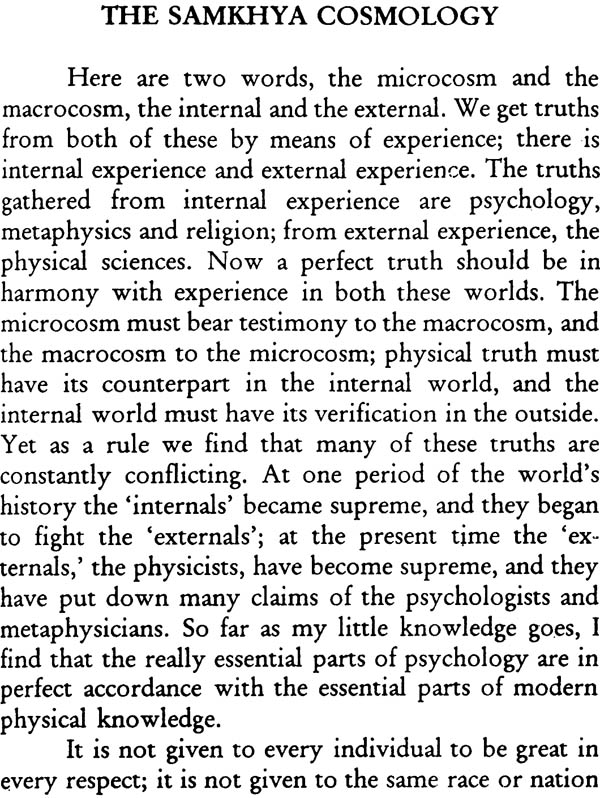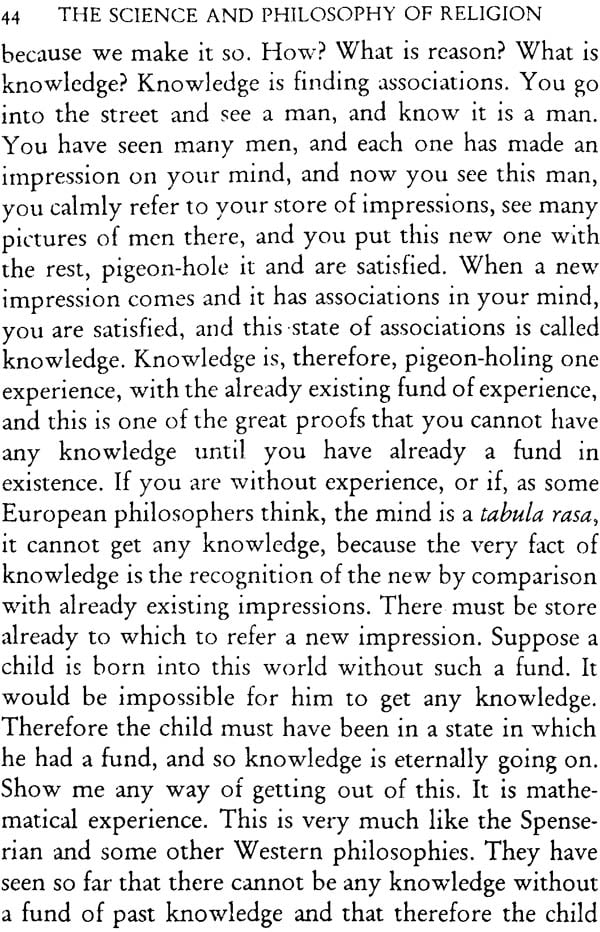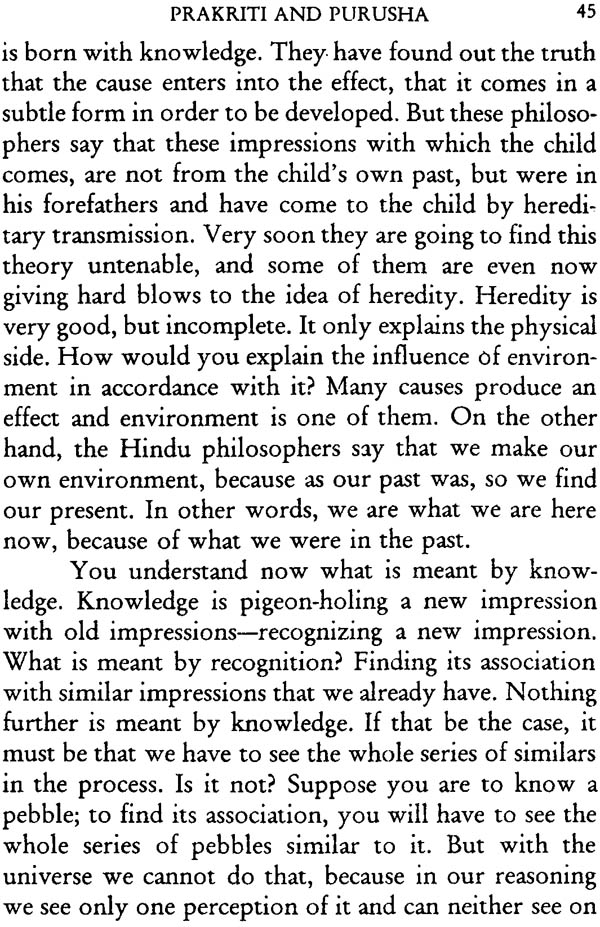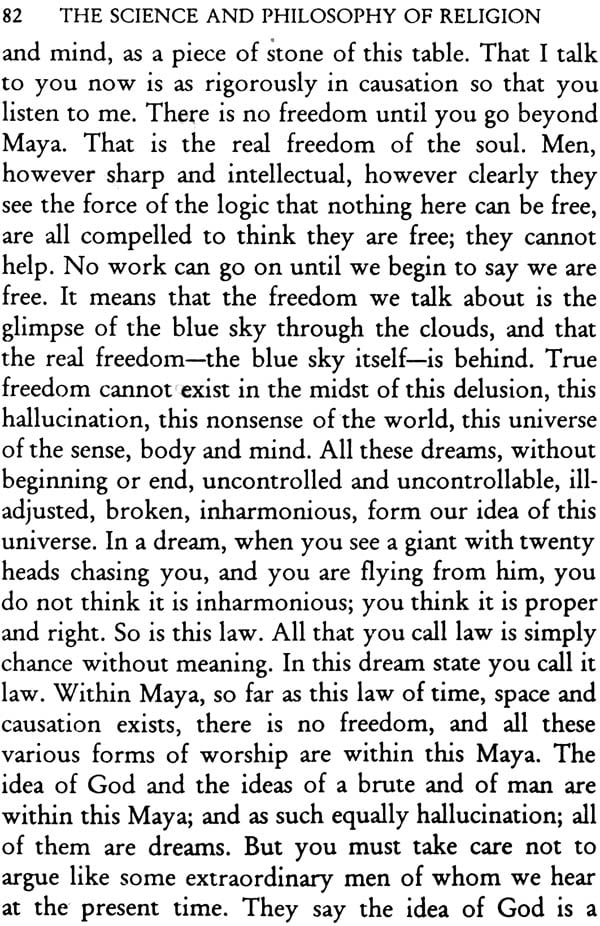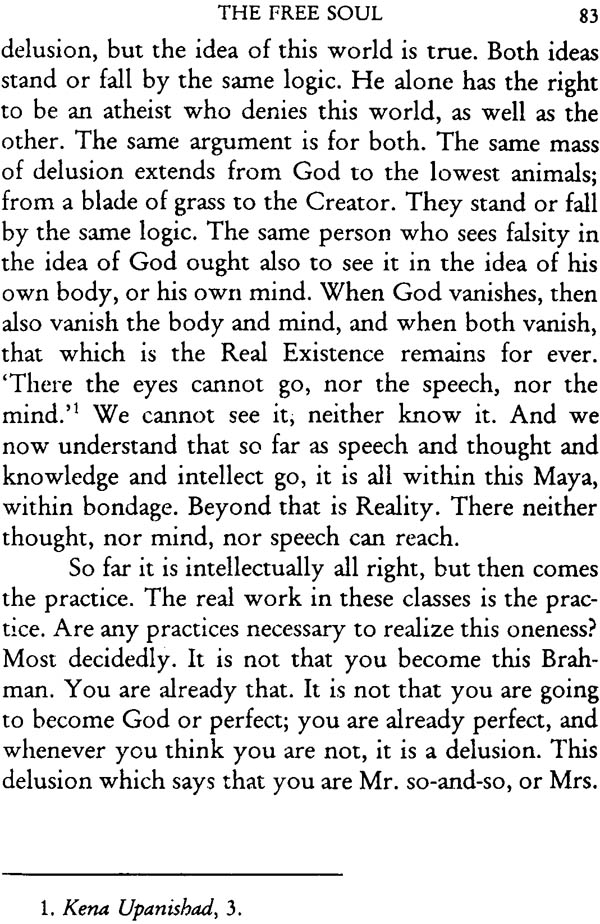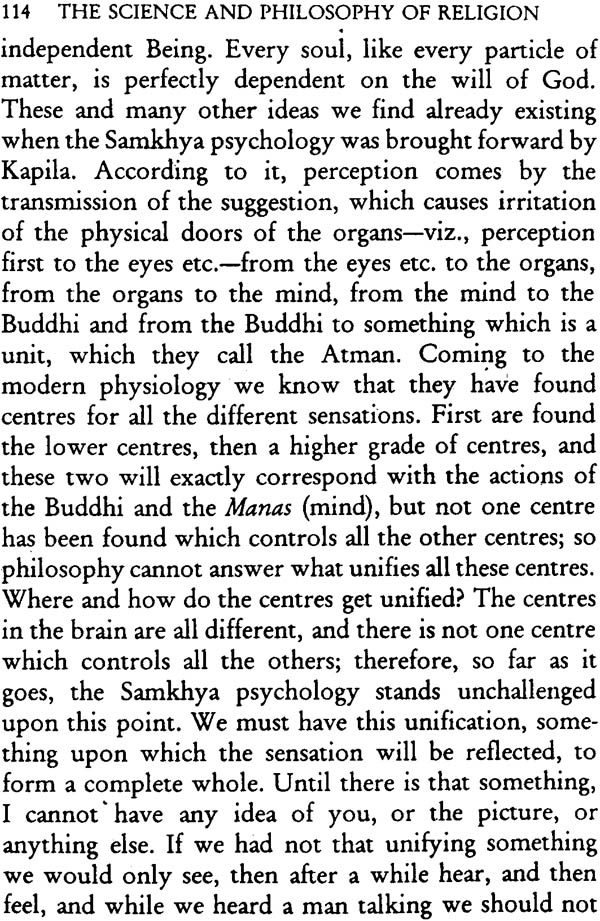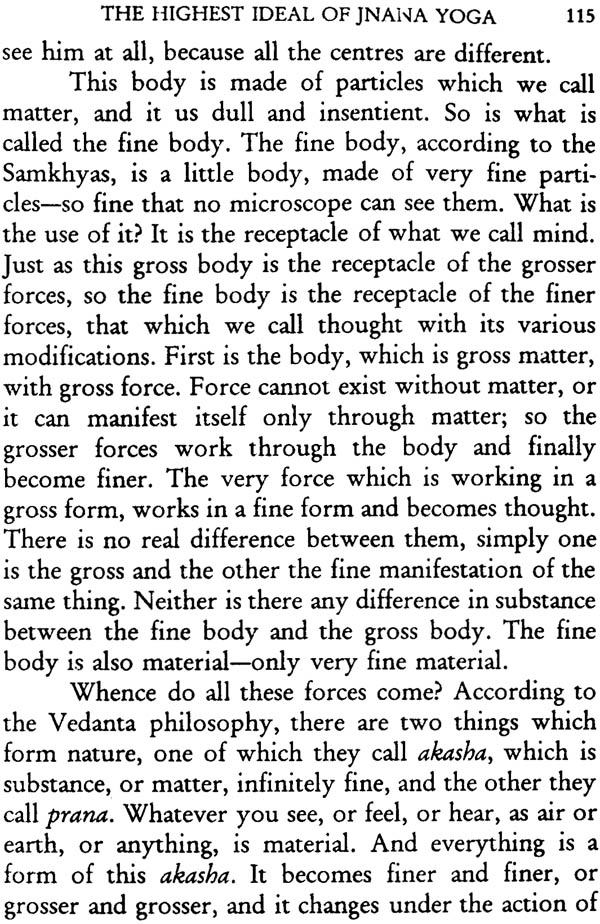
The Science and Philosophy of Religion
Book Specification
| Item Code: | IDJ328 |
| Author: | Swami Vivekananda |
| Publisher: | ADVAITA ASHRAM KOLKATA |
| Language: | English |
| Edition: | 2005 |
| ISBN: | 9788175050532 |
| Pages: | 126 (Black & White Illus: 2) |
| Cover: | Paperback |
| Other Details | 7.0" X 4.8" |
| Weight | 100 gm |
Book Description
Editor's Preface
'When any Science reaches unity, it cannot possibly go any further. You cannot go beyond this idea of the Absolute, the idea of the one, out of which everything in the universe has evolved.....The last word of Advaita is "Tattvamasi" -"That thou art." These are the words of the author of the present volume, at the end of the book. It is a clear and concise statement of the daring claim made by the sages of India, from very old times, that they have attainted to such unity in the religious field and succeeded in bringing religion to the rank of a perfect and complete science. The methods adopted by them to come to this result-were the same as followed by all the sciences of the present day, viz., observation and analysis of the facts of our experience, and a synthetical combination of the results obtained, to find out the same facts. The Kapila, Vyasa, Patanjali and indeed all the philosophers of India, including most of the Vedic seers, applied these methods in coming to their respective discoveries-has been fully discussed by the author in his books on the different Yogas.
Wonderful as the claim seems and improbable to the superficial eye, the world had not had the power and inclination to shift the grounds on which it was advanced. The difficulties of an obsolete language, expression and imagery, the too concise character of the aphorisms Sutras and leaden dross of time always overwhelmed or led astray the stray stragglers, who made an attempt along the line, while the Indian national mind was sleeping through centuries, perfectly exhausted with the superhuman exertions of the great discovery! No wonder, it needed the present period of re-awakening of 'the motherland of Dharma' and along with it the superhuman vision of Bhagvan Sri Ramakrishna and the gifted talent of Swami Vivekananda to do the works; as well as to teach humanity the way to apply the great Truth to its daily life, in India and abroad-for an Indian mind is always needed to interpret things purely Indian. To understand fully the greatness of the Swami, however, we must always bear in mind the fact that these were a series of seven lectures, delivered without notes, before a little class in New York, in the beginning of 1896. It is fortunate, indeed, that they were taken down at the time by shorthand, making it possible for us to get them printed in this present form, after the expiration of such a long time and the editor is thankful for being requested to do this work while he was in America, at the beginning of 1897.
Nothing of any importance has been changed in the body of the lectures themselves, excepting the substitution of the word Prakriti for Nature. In the editor's humble opinion there is no English equivalent for the Sanskrit word, and Nature can never be one. For the idea connoted by it is the finished result of what is connoted by the word Prakriti. Prakriti, therefore, can never mean Nature, but the primal elements and forces which form the materials for the creation of the universe. Prakriti is the cause, of which Nature is the effect, or our of which Nature is being produced. 'Primal matter and energy held in equilibrium' or 'the latent condition of primal matter and energy' expresses the idea aright. We would request the reader to keep this well-stamped in his mind to understand the words of the Swami in the following pages clearly.
This universe of ours, the universe of the senses, the rational, the intellectual, is bounded on both sides by the illimitable, the unknowable, the ever-unknown. Herein is the search, herein are the inquiries, here are the facts, whence comes the light which is known to the world as religion. Essentially, however, religion belongs to the supersensuous and not to the sense- plane. It is beyond all reasoning and is not on the plane of intellect. It is a vision, an inspiration, a plunge into the unknown and unknowable, making the unknow- able more than known, for it can never be 'known.' The search has been in the human mind, as I believe, from the very beginning of humanity. There cannot have been human reasoning and intellect in any period of the world's history without this struggle, this search beyond. In our little universe, the human mind, we see a thought arise. Whence it arises we do not know, and when it disappears, where it goes we know not either. The macrocosm and the microcosm are, as it were, in the same groove, passing through the same stages, vibrating in the same key.
In these lectures I shall try to bring before you the Hindu theory that religions do not come from without, but from within. It is my belief that religious thought is in man's very constitution, so much so that it is impossible for him to give up religion until he can give up his mind and body, until he can give up thought and life. As long as man thinks, this struggle must go on, and so long man must have some form of religion. Thus we see various forms of religion in the world. It is a bewildering study, but it is not, as many of us think, a vain speculation. Amidst this chaos there is harmony, throughout these discordant sounds there is a note of concord, and he who is prepared to listen to it will catch the tone.
The great question of all questions at the present time is this: Taking for granted that the known and the knowable are bounded on both sides by the unknow- able and the infinitely unknown, why struggle for that infinite unknown? Why shall we not be content with the known? Why shall we not rest satisfied with eating, drinking and doing a little good to society? This idea is in the air. From the most learned professor to the prattling baby, we are told to do good to the world, that is all of religion, and that it is useless to trouble ourselves about questions of the beyond. So much is this the case that it has become a truism. But, fortunate- ly, we must question the beyond. The present, the ex- pressed, is only one part of that unexpressed. The sense universe is, as it were, only one portion, one bit of that infinite spiritual universe projected into that plane of sense-consciousness. How can this little bit of projec- tion be explained, be understood, without knowing that which is beyond? It is said of Socrates that one day, while lecturing at Athens, he met a Brahmin, who went to Greece, and that he told the Brahmin that the great- est study for mankind is man. The Brahmin sharply retorted, 'How can you know man until you know God? This God, the eternally unknowable, or absolute, or infinite, or without name-you may call Him by what name you like-is the rational, the only explana- tion, the raison d'etre of that which is known and knowable, this present life. Take anything before you, the most material thing; take one of the most material sciences as chemistry or physics, astronomy or biology, study it, push the study forward and forward, and the gross forms will begin to melt and become finer and finer, until they come to a point where you are bound to make a tremendous leap from these material things into the immaterial. The gross melts into the fine, physics into metaphysics, in every department of knowledge.
Thus man finds himself driven to a study of the beyond. Life will be a desert, human life will be vain if we cannot know the beyond. It is very well to say: Be contented with the things of the present; the cows and the dogs are, and all' animals, and that is what makes them animals. So if man rests content with the present and gives up all search into the beyond, mankind will have to go back to the animal plane again. It is religion, the inquiry into the beyond, that makes the difference between man and an animal. Well has it been said that man is the only animal that naturally looks upwards; every other animal naturally looks prone. That looking upward and going upward and seeking perfection are what is called 'salvation', and the sooner a man begins to go higher, the sooner he raises himself towards this idea of truth as salvation. It does not consist in the amount of money in your pocket or the dress you wear, or the house you live in, but in the wealth of spiritual thought in your brain. That is what makes for human progress, that is the source of all material and intellectual progress, the motive power behind, the enthusiasm that pushes mankind forward.
| Publisher's Note | 5 |
| Editor's Preface | 7 |
| Introduction | 13 |
| The Samkhya Cosmology | 21 |
| Prakriti and Purusha | 36 |
| Samkhya and Advaita | 53 |
| The Free Soul | 70 |
| One Existence Appearing as Many | 88 |
| Unity of the Self | 102 |
| The Highest Ideal of Jnana Yoga | 112 |
